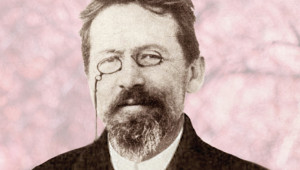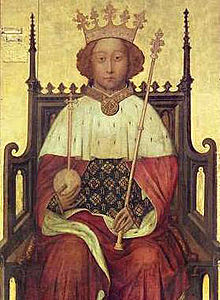Time and The Mystery of the Broken String
One of the most important stage directions in theatre history appears in Anton Chekhov’s THE CHERRY ORCHARD. It is the middle of Act II and the characters have assembled in an open space near an abandoned chapel. Madame Ranevskaya has delivered a revelatory monologue about her past, in which she recounts the punishments she has received for her sins—a fate that includes a husband who drank himself to death with champagne, then love on the rebound with a cruel younger man, and—most painfully—her little boy drowning in the river.
The former tutor of the lost child, Trofimov, counters with a speech about human progress. Lopakhin discusses his business, Yepikhodov strolls by playing his guitar, and Gayev gushes about the setting sun. “Oh wondrous nature, cast upon us your eternal rays, . . .” Varya and Anya plead with him to stop. Spoofing Gayev and his pool-playing references, Trofimov quips, “We’d rather have the yellow ball in the side pocket.” They all sit in silence, except for the mumbling old servant Firs.
And then . . .
Suddenly a distant sound seems to fall from the sky, a sad sound, like a harp string breaking. It dies away.
Much has been written about the symbolism of the broken string and how important it is to gaining access to Chekhov’s dramatic work. That the sound seems to fall from the sky, precipitation-like, a singular note of portent—gives credence to its cosmic relevance in the world of the play.
Madame Ranevskaya asks, “What was that?” and shivers and grows nervous. Lopakhin’s theory that the sound is an echo from a faraway mine shaft speaks to his bent to exploit nature for monetary gain. Gayev ventures that the sound came from “some kind of bird . . . like a heron” fixing it within a pastoral context. This is trumped by the eternal student Trofimov hearing it as the cry of another bird, the more intellectual owl. The elderly Firs chimes in and then adds scope. “It’s like just before the trouble started. They heard an owl screech, and the kettle wouldn’t stop whistling.” Gayev asks Firs, “Before what trouble?” and the old man answers: “The day we got our freedom back.”
Firs is referring to Czar Alexander II’s emancipation of the Russian serfs in 1861 and the shift away from the feudal system. A view commonly held by scholars is that “broken string” results from the tension created by the older more-natural order (as symbolized by the setting sun, screeching owl, and Ranevskaya’s tragic river) and a newer more man-made order (yellow ball in the side pocket, whistling kettle, and the arrival and departure of Ranevskaya and Gayev by train that frames the story).
The tension between the infinite and the finite, between the natural and man-made order, begins in THE CHERRY ORCHARD with the play’s first line. Lopakhin’s opening words are: “The train’s finally in, thank God. What time is it?” From here Chekhov created a play of astounding temporal complexity. Four acts later he underscores his breaking-string effect by repeating it in the play’s conclusion, the final stage directions.
Ranevskaya’s estate has been sold. Firs discovers that he is locked out. The eighty-seven year old servant, a human timepiece and representative from a bygone era lies down on the front porch. He very possible dies. The distant sound occurs, in this instance, just before the quiet that precedes the sound of an ax cutting a cherry tree.
A Source for this Sad Sound?
How did Anton Chekhov come up with this astonishing effect that has come to epitomize his dramatic work? Both the broken string sound and the idea of it seem to come from out of the blue. It is unlike any other stage direction. Where did it come from?
Helpful, I think, are Richard Gilman’s thoughts on the creative process. In his astute Checkhov’s Plays: An Opening into Eternity, Gilman says:
Memorable plays aren’t likely to spring out of polished ideas or from carefully outlined plots. I suspect that most begin in the mind as a kind of music without words, a rhythm of potentiality without details, following on an isolated image or memory or an equally isolated fragment of conversation or some kind of sound.
If like minds think alike, then theatre geniuses do too. That Chekhov admired William Shakespeare is well documented. His obsession with Hamlet was not unusual, as many Russian intellectuals had an affinity for the play. The melancholy Dane represented to Russians one aspect of the national character. This was the Hamlet of Polevoy, the Russian translator, who was as important as anyone in drawing a Russian sensibility from Corneille, Racine, Shakespeare and Schiller.
Maurice Valency, in The Breaking String: The Plays of Anton Chekhov, states that all of Chekhov’s full-length plays involve Hamlet in one form or another. And we have all benefited from this involvement. The influence of Hamlet on the Russian author’s work has had a profound effect on modern theatre. Chekhov’s reworking of the parlay between action and inaction is meaningfully demonstrated in his mature plays.
As it is with Hamlet, THE CHERRY ORCHARD is a family play with much larger implications. It is the discord between the past and present—not only within the family, but in its larger sense—from an Age of Faith to an Era of Nothingness, that creates, as Valency has written, the sound of the breaking string that we hear in each of Chekhov’s plays.
But the idea for the broken-string stage direction may have come from one of Shakespeare’s more obscure plays, Richard II. This history play (sometimes called a tragedy) features effusive poetry that often overwhelms the characterizations. It also contains one of the bard’s more memorable speeches of regret. While brainstorming for ideas about Chekhov’s sense of time, I came across and was reminded of these well-known words quoted in Robert Grudin’s Time and the Art of Living.
It is the indecisive and shallow King Richard who utters the pertinent language in a soliloquy near the end of Richard II. Fittingly, his thoughts are prompted by a stage direction calling for music.
Ha ha! keep time. How sour sweet music is
When time is broke and no proportion kept!
So is it in the music of men’s lives.
And here have I the daintiness of ear
To check time broke in a disordered string,
But for the concord of my state and time
Had not an ear to hear my true time broke.
I wasted time, and now doth time waste me.
In these few lines from this much longer speech, the word “time” occurs seven times and “broke” three times. “How sour sweet music is/ When time is broke, and no proportion kept!” is an apt description of the plight of the characters in THE CHERRY ORCHARD, their free-fall from sequential order, their temporal confusion. In particular “To check time broke in a disordered string” seems geared for Chekhov’s purpose in his last play and might have given him inspiration. And Richard’s line that he “Had not an ear to hear my true time broke” holds true for the characters in THE CHERRY ORCHARD as well, each of them disoriented within the true adversary of their lives, time.
What do you think? Do you have a broken string theory?




I found this fascinating post after a discussion this morning about Shakespeare’s famous stage direction ‘exit, pursued by bear’. I was breathless during this discussion, because I suddenly remembered my reading of Chekhov’s plays when I was about 12. You can imagine that my comprehension was limited — I was ignorant of every context that has been so interestingly laid out in this article whether it be historical or literary — but my breath snagged when I read certain stage directions. That these were lines OUTWITH the play , and such lines — it made them seem like secret messages. I knew that out of everything, their significance was greater. I read Chekhov’s plays avidly for those OUTWITH moments, for those words that resonated in me as moments of fresh and startling reality. I did not always understand those truths, but I felt deeply that in recognising them I was invited to a purer space.
Thanks very much for your comment! Important stage directions are a delight to me as well. Coming across the Richard II speech and connecting it to Chekhov’s notorious “broken string” stage direction was a defining moment for me in realizing how Chekhov thought in his response to Shakespeare. . . . I was able to encounter “exit, pursued by a bear” in a production of The Winter’s Tale directed by Arin Arbis for Theatre for a New Audience a few years ago.